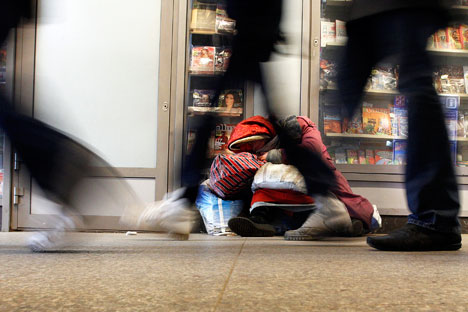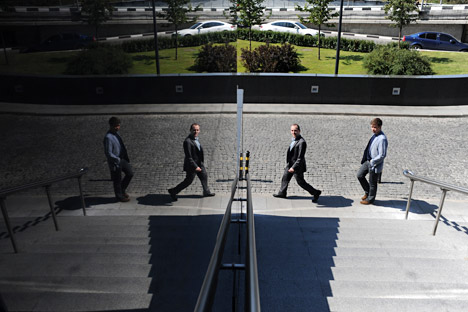The poorer Russians get, the happier they become and other mysteries

Russians believe that the crisis is serious and will last a long time.
PhotoXPress1. Poor, but happy
The economic crisis has not convinced Russians that their lives have entered rough times. The country may have sunk to the economic bottom, but Russians confidently keep their heads up, smile and say that they have never been so happy. This is the conclusion one can draw by looking at two reports: one on consumer confidence and another on happiness. Fourth quarter results show that in 2015 consumer confidence fell to minus 26 percent –the worst indicator for such a period since 2000.
But even when they felt the crisis' negative effect on their wallets, Russians were not in a rush to recognize its existence. According to the Russian Public Opinion Research Center (VTsIOM), in the first half of 2015 people watched their income dwindle and inflation grow, but at the same time their conviction that the worst was behind them became stronger.
Russians believe that the crisis is serious and will last a long time, yet it is precisely in these difficult times that VTsIOM’s happiness indicator has reached a historic high: 70 percent of respondents said they were happy. Sociologists explain this paradox as an attempt to compensate for external negatives: if people tell themselves and everyone around them that they are happy, then perhaps life will be more pleasant.
2. Quick reversal of opinions
Attitudes towards military operations can radically change in just…two weeks. In mid-September 2015, 69 percent of people surveyed by the Levada Center, an independent polling organization, were against Russia’s involvement in military operations in Syria. But by the beginning of October, 72 percent of Russians supported President Vladimir Putin's decision to conduct airstrikes on the terrorist group ISIS’ positions in Syria. It also turned out that many respondents that approve of the airstrikes do not understand on whose side Russia is fighting, who is fighting and what they are fighting for. The trust that the Russian people have in their government in relation to their full detachment from the situation in the Middle East is hard to explain, but at the same time it is also an excellent example of the principle that “the president knows better” and the desire people have for “a small victorious war.”
3. I’m an Orthodox Christian, but I don't believe in God
A Public Opinion Foundation survey has shown that the number of people who consider themselves Orthodox Christians in Russia has increased to 72 percent of the ethnic Russian population. However, only four percent of Russians go to church and participate in religious ceremonies on a regular basis. "Also, 60 percent of Orthodox adherents do not consider themselves religious and almost 30 percent of those that call themselves "Orthodox" do not believe in the existence of God.
How is this possible? It seems that during a quest for a positive national identity the words "orthodox" and "Russian" have become synonymous for many people. This is how people can state that they are “Orthodox” while at the same time not being religious or playing an active role in the church.
4. Traveling abroad is dangerous even if you’ve never been there
In December 2015 the Levada Center discovered that a majority of Russians (70 percent) had decided against traveling abroad for security reasons. The belief that going abroad had recently become very dangerous and that such trips should cease was the answer that almost half of the respondents gave. But it later was learned that 35 percent of the participants of that survey had not been abroad at all in the last five years. Of course, this could explain why it is so easy for these respondents to renounce traveling to far away lands.
5. People trust horoscopes more than the internet
The marvelous world of the supernatural and the paranormal is for some reason dearer to Russians than the internet. Judging by public surveys, it is easier for the average Russian to believe in superstitions and the end of the world than in online media and social networks. Almost 40 percent of Russians believe in devilry, yet only five percent have confidence in news found on the internet, with another 20 percent trusting the internet but still “checking” information on television to be sure. However, Russians do not believe in all otherworld phenomena and beings equally. The most “reliable” knowledge sources are superstitions and horoscopes. Meanwhile, Hollywood blockbuster heroes also hold reverential status: six percent of Russians believe in aliens and two percent think that zombies are real.
Read more: 5 easy ways to learn Russian>>>
All rights reserved by Rossiyskaya Gazeta.
Subscribe
to our newsletter!
Get the week's best stories straight to your inbox

